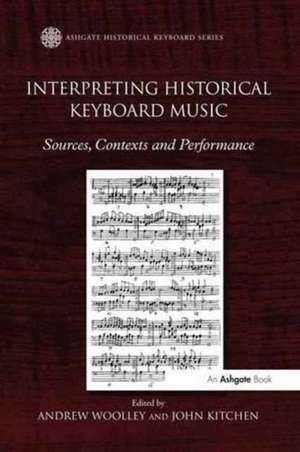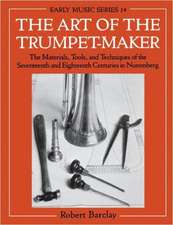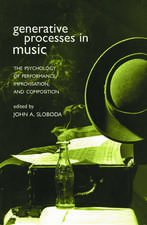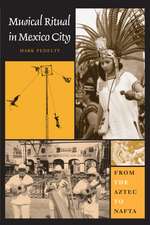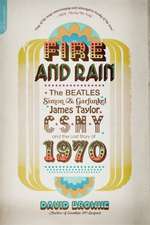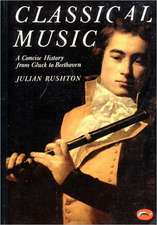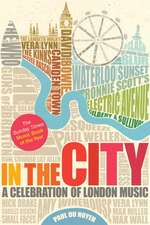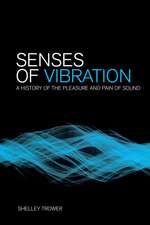Interpreting Historical Keyboard Music: Sources, Contexts and Performance: Ashgate Historical Keyboard Series
Autor Andrew Woolley, John Kitchenen Limba Engleză Paperback – 28 noi 2016
| Toate formatele și edițiile | Preț | Express |
|---|---|---|
| Paperback (1) | 469.34 lei 6-8 săpt. | |
| Taylor & Francis – 28 noi 2016 | 469.34 lei 6-8 săpt. | |
| Hardback (1) | 1061.22 lei 6-8 săpt. | |
| Taylor & Francis – 28 oct 2013 | 1061.22 lei 6-8 săpt. |
Preț: 469.34 lei
Nou
Puncte Express: 704
Preț estimativ în valută:
89.82€ • 97.53$ • 75.45£
89.82€ • 97.53$ • 75.45£
Carte tipărită la comandă
Livrare economică 22 aprilie-06 mai
Preluare comenzi: 021 569.72.76
Specificații
ISBN-13: 9781138271944
ISBN-10: 1138271942
Pagini: 328
Dimensiuni: 156 x 234 mm
Greutate: 0.45 kg
Ediția:1
Editura: Taylor & Francis
Colecția Routledge
Seria Ashgate Historical Keyboard Series
Locul publicării:Oxford, United Kingdom
ISBN-10: 1138271942
Pagini: 328
Dimensiuni: 156 x 234 mm
Greutate: 0.45 kg
Ediția:1
Editura: Taylor & Francis
Colecția Routledge
Seria Ashgate Historical Keyboard Series
Locul publicării:Oxford, United Kingdom
Notă biografică
Andrew Woolley is a musicologist and performer with research interests in music of the seventeenth and eighteenth centuries, performance practice, and keyboard music. To date he has published several articles on British and Italian music of the late seventeenth and eighteenth centuries. John Kitchen is a Senior Lecturer in Music, Organist to the University of Edinburgh, and Edinburgh City Organist. He also directs both University and church choirs, gives many solo organ and harpsichord recitals, and is in demand as a continuo player, accompanist, lecturer, writer, adjudicator and reviewer and recording artist.
Recenzii
’ ... there is much interesting scholarship here, and many important subjects visited, ... this is certainly an important contribution to our understanding of keyboard music through the centuries, and should be welcomed as such.’ Douglas Hollick, The Consort ’Ashgate has served the present editors and contributors well in a major book produced to a high standard.’ The Musical Times ’There is plenty written on the subject of keyboard interpretation, but the present collection, with it breadth of materials and scope, makes a unique contribution to a contextualized understanding of the creative processes in keyboard music, and ideas that intertwined with these processes. ... this collection shows the extent to which discourses on keyboard interpretation have matured and diversified over the years. Woolley and Kitchen are to be commended for their outstanding editorial work and for performing the Herculean task of providing coherence to the collection .... The book will appeal to a wide readership, particularly to those who are concerned with the broader issues of keyboard interpretation. As the inaugural volume of the Ashgate Historical Keyboard Series, this book sets an extremely high standard.’ Music and Letters ’This book is intended for scholars of keyboard music interested in music of the sixteenth to the nineteenth centuries. ... If Ashgate’s series can generate some momentum this book will be the beginning of an important initiative in keyboard music studies.’ David Rowland, Ad Parnassum
Cuprins
Introduction; I: Renaissance Keyboard Music; 1: Some Aspects of P-Cug, MM 242; 2: Making Connections; 3: William Byrd's My Ladye Nevells booke (1591); II: Seventeenth-Century Keyboard Music; 4: Giovanni Maria Trabaci and the New Manner of Inganni; 5: Places of Memory and Invention; 6: The Libro di Fra Gioseffo da Ravenna; 7: A Discourse of Styles; III: Performance Practice; 8: Questions of Keyboard Temperament in the Sixteenth Century 1; 9: Seventeenth-Century Harpsichords; 10: ‘In playing those bells, his amazing dexterity raised my wonder much higher'; 11: Dynamics and Orchestral Effects in Late Eighteenth-Century Portuguese Organ Music; 12: Czerny and the Organ: Pragmatism, Prestige and Performance Practice 1; IV: Perspectives on Eighteenth-Century Repertoire; 13: Some Reflections on François Couperin's ‘New and diversified character'; 14: Music for Connoisseurs and Amateurs: C.P.E. Bach and the Keyboard 1; 15: João Cordeiro da Silva (1735–1808?): A Portuguese Galant Keyboard Composer; V: The Nineteenth-Century Piano and Repertoire; 16: Grand and Grander; 17: Left-Hand Techniques in Carl Czerny's Pedagogical Piano Works and Nineteenth-Century Pianism; 18: In the Footsteps of Jean Paul; 19: A Forgotten Repertoire
Descriere
In recent decades interest has turned towards a contextualized understanding of creative processes in music, and keyboard studies appears well placed to contribute to the exploration of this wider concern. The essays collected here encompass the range of research in the field, bringing together contributions from performers, organologists and music historians. Questions relevant to issues of creative practice in various historical contexts, and of interpretative issues faced today, form a guiding thread. Its scope is wide-ranging, covering the mid-sixteenth to early twentieth century.
